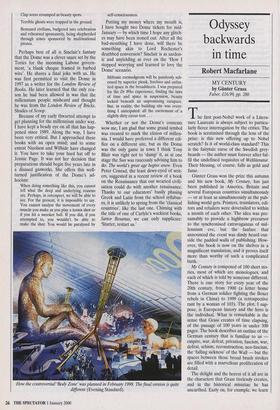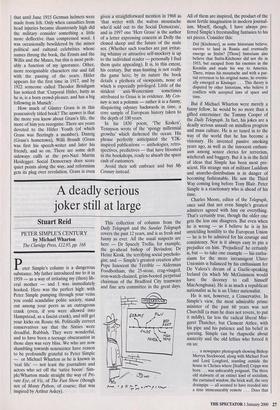Odyssey backwards in time
Robert Macfarlane
MY CENTURY by Gunter Grass Faber, £16.99, pp. 280 The first post-Nobel work of a Litera- ture Laureate is always subject to particu- larly fierce interrogation by the critics. The book is scrutinised through the lens of the prize: is this new offering up to Nobel scratch? Is it of world-class standard? This is the fairytale curse of the Swedish grey- beards — the author must forever after ful- fil the undefined requisites of Weltliteratur. Their blessing, of course, falls as gold and fame.
Gunter Grass won the prize this autumn and his new book, My Century, has just been published in America, Britain and several European countries simultaneously — or at least as simultaneously as the pub- lishing world gets. Printers, translators, edi- tors and retailers were dovetailed to within a month of each other. The idea was pre- sumably to provide a highbrow precursor to the synchronised extravaganzas of mil- lennium eve, but the fanfare that announced the event was dimly heard out- side the padded walls of publishing. How- ever, the book is now on the shelves in a magnificent translation, and it proves itself more than worthy of such a complicated birth.
My Century is composed of 100 short sto- ries, most of which are monologues, and each of which is told by someone different. There is one story for every year of the 20th century, from 1900 (a letter home from a German soldier fighting the Boxer rebels in China) to 1999 (a retrospective rant by a woman of 103). The plot, I sup- pose, is European history and the hero is the individual. What is remarkable is the sense that Grass creates of time elapsing, of the passage of 100 years in under 300 pages. The book describes an outline of the German century that is familiar to us empire, war, defeat, privation, fascism, war, defeat, schism, reconstruction, neo-fascism, the 'falling sickness' of the Wall — but the spaces between those broad brush strokes are filled with a marvellous proliferation of detail.
The delight and the horror of it all are in the characters that Grass tirelessly creates, and in the historical minutiae he has unearthed. Early on, for example, we learn that until June 1915 German helmets were made from felt. Only when casualties from head injuries became disastrously high did the military consider something a little more deflective than compressed wool. I was occasionally bewildered by the minor political and cultural celebrities whose names throng the book, the Ernsts and the Willis and the Maims, but this is most prob- ably a function of my ignorance. Other, more recognisable characters rise and fall with the passing of the years. Hitler appears for the first time in 1917, and by 1922 someone called Theodor Briidigam has noticed that 'Corporal Hitler, batty as he is, is a born crowd-pleaser, and has a big following in Munich'. How much of Giinter Grass is in this possessively titled book? The answer is that the more you know about Grass's life, the more of him you recognise. There are years devoted to the Hitler Youth (of which Grass was fleetingly a member), Danzig (Grass's hometown), Willi Brandt (Grass was first his speech-writer and later his friend), and so on. There are some deft sideways cuffs at the pro-Nazi Martin Heidegger. Social Democracy does score quiet points along the way, and reformism gets its plug over revolution. Grass is even given a straightforward mention in 1968 as `that writer with the walrus moustache who'd sold out to the Social Democrats', and in 1997 one 'Herr Grass' is the author of a letter expressing concern at Dolly the cloned sheep and the future of the male sex. (Whether such touches are just irritat- ing whimsy or attractive self-mockery is up to the individual reader — personally I find them quite appealing). It is, to this extent, his century. But man-hunting is not really the game here; by its nature the book details a plethora of viewpoints, none of which is especially privileged. Little of the strident anti-Westernism sometimes attributed to Grass is in evidence. My Cen- tury is not a polemic — rather it is a funny, disquieting odyssey backwards in time, a core sample of European history taken to the depth of 100 years. In his 1830 poem, 'The Kraken', Tennyson wrote of the 'spongy millennial growths' which darkened the ocean. His phrase perfectly anticipated the Y2K- inspired publications — anthologies, retro- spectives, predictives — that have bloomed in the bookshops, ready to absorb the spare cash of customers.
Avoid their soft embrace and buy My Century instead.



















































 Previous page
Previous page